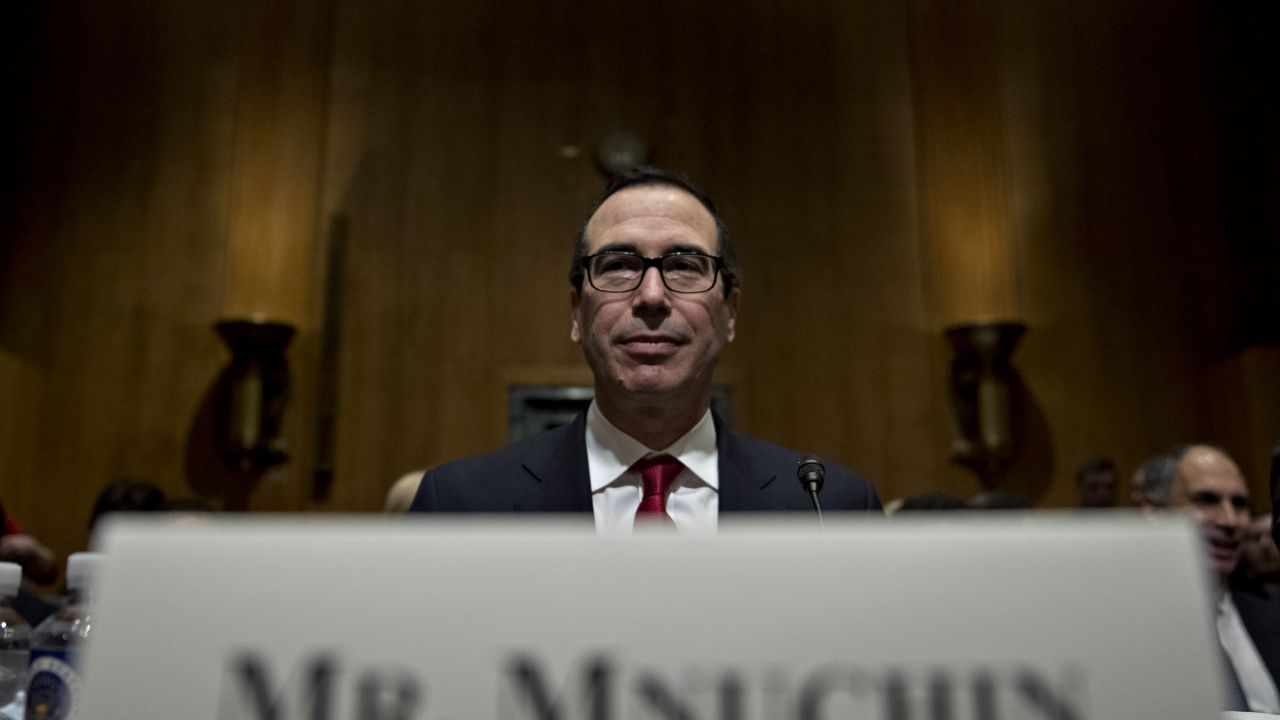
Mnuchin has said that the facilities “achieved their objectives,” which in his mind was to prop up Wall Street. (Photo by Andrew Harrer/Bloomberg via Getty Images)
This article is adapted from Unsanitized: The Election Daily Report put out by The American Prospect. You can find the original publication here.
First Response
The CARES Act’s Federal Reserve lending facilities, which I’ve lovingly called the money cannon, created effectively a giant bank with up to $4.5 trillion in lending capacity. Just the pre-positioning of those resources has been enough to keep investors satisfied that they would not be allowed to lose money during the pandemic, which they have not.
There were pretty strong hints that Republicans were disinterested in continuing the money cannon after it technically expires at the end of the year. The deadline could be extended, but Treasury would have to agree to the terms (or maybe not; more on that in a second). And yesterday, Steve Mnuchin pulled the plug.
On December 31, the corporate credit facilities, along with the Main Street Lending Program (MSLP) and the Municipal Liquidity Facility (MLF), will end. That’s $195 billion in Treasury funds that could support close to $2 trillion in lending. (The other roughly $250 billion that Treasury could devote to Fed programs wasn’t even ever set up.) Mnuchin even asked for the $70 billion Treasury had already given to the Fed as part of the lending facilities, saying that it was unlikely to be needed since the lending volume has been so miniscule.
Everyone is screaming that Mnuchin is engaging in political sabotage of the incoming Biden administration. But that’s only if you think the goal of government is to keep financier wallets well-stocked. The money cannon has not been employed to much useful purpose, and I just don’t believe a Biden Treasury would suddenly prod it in that direction either. The money cannon has one use, if only rhetorically: by being decommissioned, the government can get to the work of aiding the real economy through the final rough patch of the pandemic.
Mnuchin has said that the facilities “achieved their objectives,” which in his mind was to prop up Wall Street. It’s hard to argue with his myopic viewpoint. The money cannon unstuck markets and made a lot of people rich amid mass chaos. We are now in a different place than we were in March. The stock market is a snapshot of the expectations of future economic outcomes. And the hopes of a vaccine are doing what the money cannon did, raising those expectations that the economy will come roaring back. (Pfizer just filed for their emergency use authorization today.) There will be lots of winners and losers here, but if you’re just talking about the markets in aggregate, they see the pandemic’s end in sight.
The Fed is of course upset, openly disagreeing with Mnuchin in a statement: “The Federal Reserve would prefer that the full suite of emergency facilities established during the coronavirus pandemic continue to serve their important role as a backstop for our still-strained and vulnerable economy.” The problem with this is that it’s not and has never been a backstop for the economy, but a backstop for the stock market. I suspect the Fed is angrier that there’s been an imposition on their authority.
Anyway, Mnuchin has a ready retort to the Fed’s entreaty, and an unusually populist one for the Goldman Sachs veteran: give the money cannon to the people. “We have $500 billion to use on fiscal stimulus that won’t cost taxpayers a penny,” he told CNBC today. First of all, it’s $454 billion, and second of all, it will cost taxpayers. In a sign that everyone pretty much knew that the money cannon was just designed to keep money flowing on Wall Street, the Congressional Budget Office never actually scored it as costing any money. The gains from the lending interest would outweigh any losses absorbed by the Treasury fund, CBO said. So there isn’t a pot of money that could just go from the money cannon to the public.
Rhetorically, however, what Mnuchin’s saying is completely on point, and should be taken up by Democratic leaders. Even the Republican Treasury Secretary is now admitting that Wall Street has had enough support, and it’s time to give the same support to the general public in this critical moment, as a bridge to the vaccine’s eradication of the virus.
Now, Chuck Schumer said yesterday that staff-level talks on a coronavirus aid package have begun, the first signal of any negotiation at all related to Mitch McConnell in eight months. But nobody expects that the rhetorical wallop of Mnuchin’s claim will add half a trillion dollars to whatever the Senate is cooking up. So isn’t Mnuchin, as a servant to Trump, just depriving the incoming president of an already authorized tool of Fed lending, when it could be needed the most?
I mean… it’s clear that much could be done with those facilities to help stabilize a teetering economy, most notably by using the MLF to prevent crippling austerity at the state and local level. (Rich states like California with progressive tax structures have found windfalls in their treasuries, in large part because of the Fed propping up the stock market, so there’s slightly less need there.) To a lesser extent, the Main Street Lending Program could support small business. It’s definitely notable that Mnuchin wants to end the programs that could help public employees and small businesses, now that the threat to investors has subsided.
My problem is that I don’t believe the Fed would actually do anything of value with the authority granted it. It’s been eight months so far; two MLF loans have been made, despite widespread pressure from Democrats. The theory is that Treasury has been the roadblock all along to lending freely or using the money cannon in any unorthodox way. However, the Fed has plenty of authority to aid state and local governments outside of the money cannon, without Treasury having veto power over it. There’s no reason the Fed needs that permission slip, as Robert Hockett explains.
What they actually want is political cover, in the form of a Biden Treasury Department that’s more willing to push the envelope. However, there are a lot of assumptions about that which I think are dubious. Jerome Powell has not struck me as willing to use short-term, endlessly-rolled-over loans to give states and localities grants that don’t have to be paid back for decades, or something similarly generous, even if Biden’s radical liberal Treasury Secretary (who, er, won’t be a radical liberal) gives the go-ahead.
We do need more support for the economy, even after the vaccine is distributed. I agree with Dean Baker that hopes of a V-shaped recovery are somewhat overwritten. I just am skeptical that the Fed would ever provide what’s needed, and if you have a Republican saying to transfer Fed authority into money for people, I say you take him up on it.
The Fed, incidentally, could reject Treasury’s request to give back the $195 billion. There’s also about $800 billion in lending capacity available through the Exchange Stabilization Fund; that’s about 40 times more than the Fed has lent to date. And, the programs could be restarted three weeks after they shut, when Joe Biden is inaugurated. So what is this freak-out from the likes of Jason Furman (“reckless mistake”) and Paul Krugman (“effectively trying to create a financial crisis”) and economic analysts (“like stripping the Titanic of its lifeboats”)?
Because these are people that wake up in the morning worrying about whether we’ll have a Goldman Sachs, not worrying whether we’ll have a middle class. Any wind-down of the entity that “calms markets” and protects their assets is meddling with the very forces of nature. The Fed has plenty of power without these programs, and you can argue that fiscal policy is stuck because investors are so protected. If you want to get people through this terrifying final stretch of the economic crisis, you’ll take up precisely Mnuchin’s argument: slice up the money cannon and give it to the people.
Days Without a Bailout Oversight Chair
238.
Today I Learned
- An update on yesterday’s Unsanitized: the Tyson managers who bet on their assembly line workers getting COVID have been “suspended.” Not fired? (Wall Street Journal)
- The CDC is now recommending that people stay home for Thanksgiving. (Centers for Disease Control and Prevention)
- Airline bookings are starting to fall, suggesting that the message is hitting home. (Wall Street Journal)
- Remdesivir rejected as a therapy for COVID by the World Health Organization. (New York Times)
- The European surge is starting to ease amid restrictions. The protective measures work. (Axios)
- Brexit talks suspended after chief negotiator gets COVID. (Bloomberg)
- Sen. Rick Scott (R-FL) has COVID, as McConnell warns his colleagues to stay healthy or risk not getting a bunch more judges confirmed. (NBC News)
- The movie business is just utterly transformed, probably forever. (Vox)
- Greenhouse gas emissions in the COVID year down to 1983 levels. (Washington Post)
- Matt Taibbi finds a pandemic villain: Allianz. (TK News)




